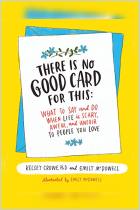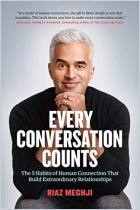Únase a getAbstract para acceder al resumen.

Únase a getAbstract para acceder al resumen.
Dana Lacy Amarisa and Nate Hinerman
What Do I Say? Condolences for Every Occasion
Commonwealth Club, 2024
¿De qué se trata?
What should you say when “sorry for your loss” doesn’t quite cut it?
Recommendation
When writer Dana Lacy Amarisa lost two children and her father within a 20-month period, she heard myriad well-meaning but insensitive condolences that invalidated her pain. In the grips of grief, she felt too “misunderstood,” “unseen,” and “vulnerable” to offer a retort. Once she pulled through the agony, she committed to studying and writing about why people bungle condolences. In a lively discussion with psychotherapist Nate Hinerman, Amarisa explains the essence of kind, useful, heartfelt condolences. Their insights will teach you how to show up for loved ones who are suffering.
Summary
About the Speakers
Writer Dana Lacy Amarisa is the founder of the Be A Bridge Condolences Project, which teaches how to console people who are grieving. Philosopher and psychotherapist Nate Hinerman teaches at the University of San Francisco.


























Comment on this summary
If you often discover your self puzzled whilst trying to specific condolences, Florence Isaacs' "What Do I Say? Condolences for Every Occasion" is an invaluable aid. This e-book is pretty advocated for anyone who wants to provide proper aid and luxury to those grieving, but feels unsure approximately a way to accomplish that accurately.
Isaacs affords a comprehensive manual that covers a wide range of situations and relationships, ensuring that your phrases are not best appropriate however additionally deeply comforting. Whether you need to write a condolence note, explicit sympathy in person, or navigate the etiquette of virtual communications, this e book gives clean, realistic advice and numerous sample messages to guide you.
Key reasons to advocate this e book include:
1. **Practical Advice**: The e book gives step-with the aid of-step steering on what to mention and what to keep away from, making the venture of writing or speaking condolences less daunting.
2. **Empathetic Approach**: Isaacs emphasizes the importance of empathy and sincerity, supporting readers understand the emotional desires of individuals who are grieving.
3. **Versatility**: The e book addresses special sorts of losses and relationships, from near own family participants to colleagues, and offers tailor-made advice for each scenario.
Four. **Digital Age Adaptability**: With the upward push of digital verbal exchange, the e-book’s steerage on expressing condolences through e mail and social media is mainly relevant.
Five. **Additional Support**: Beyond words, Isaacs discusses other methods to provide guide, which includes practical help and suitable condolence items.
6. **Sample Messages**: The inclusion of sample messages for various conditions serves as a beneficial place to begin, ensuring your condolences are heartfelt and suitable.
**Who Should Read This Book:**
- **Individuals**: Anyone who desires to offer significant guide to pals, family, or colleagues at some point of instances of loss.
- **Professionals**: Those in roles in which expressing condolences is a ordinary a part of their responsibilities, along with HR professionals, managers, or customer support representatives.
- **Organizations**: Companies seeking out guidance on how to aid personnel and customers who're grieving.
Florence Isaacs' "What Do I Say? Condolences for Every Occasion" is a compassionate and realistic guide that makes the challenging task of expressing condolences greater approachable. By following her advice, you can offer comfort and guide to folks that want it most, creating a wonderful effect all through tough instances.